- Home
- Anders de la Motte
Rites of Spring Page 29
Rites of Spring Read online
Page 29
‘Aren’t you going to ask how I am? Isn’t politeness the glue that holds society together, in spite of everything? Isn’t that what proves we’re human and . . .’
‘How are you, Leif?’ She closes her eyes, pinches the bridge of her nose.
‘I’m dying of lung cancer, how the fuck do you think I am?’ His laughter is interrupted by a fit of coughing. ‘How’s the reprieve petition going? Have you looked up what to do?’
‘Not yet.’
‘Not yet. What the fuck are you waiting for? Are you hoping I’ll die so that the problem will solve itself? In which case I can tell you that I’ve arranged an interview with a newspaper after the weekend. It’ll be a real sob story about a hardened criminal on his deathbed who regrets what he’s done. There might be a few lines about you too – my angry daughter who refuses to write my reprieve petition, when all I really want is for her to forgive me . . .’
‘Is it?’
‘What?’
‘Is that what you want? For me to forgive you? Is it important to you?’
‘Don’t be stupid.’
‘So the answer to the question is no?’
There is silence for a few seconds; she can almost hear him thinking on the other end of the line.
‘Just do as I ask, Jenny.’
The call ends abruptly, and she sits there with the phone in her hand, anger pounding behind her eyes. She massages one temple, trying to ease the pressure. In the end she opens the drugs cabinet and takes two painkillers. There are other options – stronger, more effective. For a brief moment she considers taking something else, something that will stop her mind from racing, just for a few hours.
She closes and locks the cabinet before the impulse becomes too hard to resist.
The hum of conversation from the corridor is louder now.
‘Stay here, sweetheart,’ she says to Emee. She hangs the BACK SOON sign on the door.
*
The hall is so full that people are standing along the walls. The double doors to the corridor are open, as are the windows. Thea stays in the background, craning her neck to see over those standing in the doorway.
Three men are sitting on the podium. One of them is Philippe. Behind them, on a white screen, a PowerPoint slide says: Nordic Vanadium. A mining company for the 2020s.
Thea stays for a while, listening to the presentation. The image on the screen changes, showing electric cars, forests, rivers, cheerful workers in hi-vis jackets and yellow hard hats. Key words are superimposed on the pictures: responsibility, humility, resource extraction, environmental awareness, switch to green technology.
It’s just a longer variation of what Philippe has already told her. They’re test drilling to see if the find is worth an investment in large-scale mining.
As Thea expected, the audience’s attitude is extremely negative, and the longer the presentation goes on, the more often it’s interrupted by angry comments.
Philippe’s two Swedish colleagues repeatedly stress that the project will bring job opportunities and generate tax revenue. They emphasise the same argument as Philippe: they will extract natural resources with minimum impact on the environment, they will restore the landscape when they’ve finished. The villagers, however, are not convinced.
‘You’re just coming here to plunder our resources,’ says a familiar voice from the front row. ‘You’ll take what you want, ruin our land and our waterways, then you’ll leave. We’ve seen it before.’
This elicits a long round of applause.
The men on the podium try to respond to Ingrid, but are drowned out by booing and more angry remarks. They do their best, but after a few minutes they thank the audience and end the meeting.
As soon as they step down, all three of them are surrounded by a group of irate villagers. They patiently answer questions for a few minutes, then begin to move towards the exit.
Philippe spots Thea, and his serious expression gives way to a smile.
‘Docteur Lind, how nice to see you here. Did we manage to convert you to our cause?’
Thea smiles and shakes her head. People push past behind Philippe, giving them both dirty looks.
‘How’s your hand?’
‘Better, thank you. When do you think the stitches can come out?’
‘Call in early next week – there’s no rush.’
‘Will do. Au revoir, docteur!’
He waves goodbye with his bandaged hand and disappears through the door with his colleagues.
Someone grabs Thea’s arm. It’s her mother-in-law.
‘Do you know him?’
‘He’s one of my patients.’
‘He’s a thief. The whole company is a collection of villains.’ Ingrid is white-faced; Thea has never seen her so agitated. ‘They want to destroy the whole area, fill it with huge, dusty open-cast mines. Trucks and excavators working day and night. He’s got no business here.’
‘I’m well aware of what he does, but I can’t refuse anyone medical treatment.’
Ingrid doesn’t look happy with her answer, but someone calls her name and she walks away without saying goodbye.
*
On the way back to the surgery, Thea stops and looks out of one of the front windows. The car park is full, and there are lots of people chatting in small groups. There are many familiar faces: Per and Erik Nyberg, Dr Andersson, Little Stefan, Tanya and her husband.
Thea turns away and almost bumps into Jan-Olof. He gives her a brief nod, then slides past, heading for the door.
Emee jumps up at her when she gets back to the surgery. The dog is pleased to see her, yet at the same time she seems anxious, as if she didn’t appreciate being left alone.
Thea gathers up her things, puts Emee on the lead and locks up for the day. The car park is quieter now. She settles Emee in the boot; only when she gets into the driver’s seat does she see something tucked under the windscreen wiper.
A third Green Man figure, maybe twenty centimetres high. Unlike the others, someone has ripped off all the leaves, so that the thorns are clearly visible.
69
S
he drives home as fast as she can, constantly checking the rear-view mirror. Arne must have put the Green Man on her windscreen. The reason is crystal clear: she has found out his secret. If she had any doubts, they’ve been swept away. Arne was at the stone circle when Elita was killed. Maybe he was the one who killed her. In which case how far is he prepared to go to keep Thea quiet?
She has to talk to David, has to do something – but there is no sign of David’s car by the castle or the coach house.
She lets Emee out of the car, drags her towards the house. The dog resists, plants all four paws firmly in the gravel. She’s had enough of being locked up and kept on the lead.
‘Inside!’ Thea snaps. She notices too late that Emee has managed to wriggle out of her collar. Emee turns and races off in the direction of the bridge.
‘Shit!’ Thea tries the whistle, but to no avail. She runs into the house. Her suitcase is still standing by the wardrobe, and for a second she toys with the idea of disappearing. Leaving Tornaby, the spring sacrifice and her father far, far behind her.
But Margaux would never forgive her if anything happened to Emee.
She changes into her old wellingtons and sets off. As soon as she reaches the forest she turns left, aiming for the deer enclosure. She keeps calling Emee’s name and blowing the whistle. She tries not to think about the dead deer or the fact that Emee is a predator.
After about five minutes she hears rustling in the undergrowth, and to her relief Emee appears. The dog seems tired; her head is drooping and she doesn’t object to being put on the lead. Thea doesn’t tell her off. She’s in a hurry to get back to the coach house. She’s put it off for too long, but now she has to talk to David. Tell him what she found at his uncle’s house, what she suspects.
*
David doesn’t arrive home until gone eight o’clock, and she can sense his i
rritation the second he walks in. She’s made dinner, poured them each a glass of wine, but one look at his face tells her that’s not going to work.
‘Mum called me,’ he says without even taking off his jacket or sitting down. ‘Apparently, you’ve been round to Arne’s, asking questions about Elita Svart. What the hell are you doing, Thea?’
‘She was the one who told me to go and see Arne if I had any questions.’
‘Did she tell you to snoop around his house? Poke about among his things?’
‘It was Arne’s Polaroid camera that was used to photograph the four of you and Elita in the stone circle. He knew Elita, and he was there that night. Maybe he was the one who killed her.’
David stares at her. She hadn’t planned on blurting everything out like this, especially not the last bit, and she can see from his expression that she’s made a mistake.
‘Arne was there,’ she says again. ‘He’s threatened me. Left little Green Man figures on my car.’
David shakes his head.
‘I was there, Thea. Have you forgotten that? And I didn’t see Arne. Or do you think I’m lying?’
‘No . . .’ She pauses, playing for time. ‘He might have been hiding. Maybe he came out after you’d all run away.’
David shakes his head again.
‘I went back. I saw Leo bending over the sacrificial stone. Leo, who later confessed to having murdered Elita.’
Thea doesn’t know what to say.
‘I’m in the middle of the most important project of our lives,’ David goes on. ‘I’m working around the clock to get everything sorted, keep everyone happy. And the best you can come up with to help me is to start digging up the past. Making people angry and suspicious.’
Rage takes over his voice, making his accent stronger, oddly enough.
‘Plus you’re hanging out with people from the mining company who want to destroy the whole area. Brilliant way of fitting in with the community, Thea – well done!’
‘I’m not hanging out with him. He’s my patient . . .’
‘After everything I’ve done for you! Everything I’ve given up for your sake.’
The comment makes something that’s been bubbling away inside her for a long time suddenly boil over.
‘What the fuck have you given up, David? Your restaurants, your career? Are you seriously putting that on me?’
She gets to her feet, goes and stands in front of him.
‘You were a crap chef, David. Your colleagues were scared of you. You slept with several of your female employees, and please don’t bother denying it. The only thing that ruined your career was you, and the sooner you accept that, the better.’
She knows she’s gone too far before she’s finished the sentence. David has almost the same look in his eyes as when he was fighting with the builder the other day. He takes a step forward, clenches his fists. Emee stands up, growls loudly.
David freezes. He and the dog stare at each other for a few seconds.
‘Lie down, you little fucker!’ he snaps.
Emee doesn’t obey him. Instead she moves forward and bares her teeth, still growling.
David backs away, then turns and disappears through the front door, slamming it behind him.
70
T
hea gives David an hour or so to calm down before she calls him. He doesn’t answer.
In the end she goes to bed. She tries to push aside all thoughts of Elita, David and Arne, but it’s impossible. Everything is spinning around in her mind; it stays with her in her sleep.
She dreams of the Polaroid, Elita and the children around the sacrificial stone. The ghostly hawthorn trees behind them are swaying in the wind.
Come to the stone circle at midnight. The spring sacrifice.
‘Wait a minute!’ Elita shouts.
Thea realises that the girl is talking to her. She is the one holding the camera, peering through the little viewfinder. The children in the masks are shuffling uncomfortably. A hare, a fox, an owl and a deer.
‘Pull harder!’ Elita tells them, tugging at the silk ribbons.
The children do as they’re told.
‘Now!’ Elita says to Thea. ‘Take the picture now!’
The next moment everything has changed. It’s night. A fire is burning in the stone circle. The sound of drumming and chanting reverberates from a tape player.
Elita is lying on her back on the sacrificial stone, looking up at her.
‘He’s on his way,’ she whispers. ‘Things have been set in motion, and the Green Man is riding through the forests. Can you hear him?’
Hoof beats are approaching in the darkness.
‘Tell the truth,’ Elita says. ‘Tell them who did it. Who killed me. The strongest love is unrequited love!’
*
Thea is woken by a sound, and at first she thinks David has finally come home. But it’s Emee, coughing.
She switches on the lamp. The dog is standing by the door; she is retching now, and before Thea can get out of bed Emee has thrown up on the floor.
‘What’s wrong, sweetheart?’
Emee tries to walk towards her; she wobbles and falls over. Thea is on her feet in a second. Emee gets up, seems confused. Whimpers loudly. Throws up again.
A sweetish, chemical smell spreads through the room, and Thea recognises it immediately. She’s experienced it before, many times. She grabs Emee’s jaws, forces them apart, sniffs.
Glycol – anti-freeze, no doubt about it. Emee has been poisoned by glycol, which means it’s urgent.
She pulls on her clothes, shouting for David.
No reply.
His bedroom door is open. The room is empty, the bed untouched. She tries his mobile but it goes straight to voicemail. Emee vomits again; she’s finding it difficult to stand.
Thea steers her towards the car and manages to put her on the back seat. She googles the nearest twenty-four-hour veterinary hospital; it’s in Helsingborg, about forty minutes away.
Emee needs help, right now.
Thea jumps in the car, floors the accelerator. The castle is in darkness; David’s car is parked by the east wing. The kitchen door is locked. She hammers on it as hard as she can, shouting his name. She quickly realises that he’s probably sleeping in one of the upstairs rooms, and can’t hear her.
She gets back in the car, drives around to the front. Keeps one hand on the horn, flashes the headlights repeatedly. No response. She calls David’s name over and over again, pointlessly.
A faint whimper from the back seat; Emee can’t wait any longer. They have to go.
Suddenly a silhouette appears from the west wing. It’s Hubert, in his dressing gown and slippers, hair standing on end.
‘What’s going on?’
Thea opens the car door. ‘Emee’s been poisoned – glycol.’
‘How?’
‘I don’t know. Something she ate.’
‘Anything I can do?’
‘Have you got any vodka?’
‘Vodka?’
‘I need alcohol – as pure as possible.’
‘I’ve got a bottle of Absolut in the drinks cupboard.’
‘Go and fetch it and get dressed. You have to drive us to the veterinary hospital.’
Hubert nods and runs back the way he came.
Thea takes her medical bag out of the boot and gets into the back seat. Emee lifts her head; she’s been sick again, and the sweet smell fills the car.
Thea digs out a syringe, fits a cannula.
Hubert’s back. He’s put on trousers, his oilskin and wellingtons, but is still in his pyjama jacket. ‘Here!’ He hands her an unopened bottle of Absolut vodka.
‘The veterinary hospital is in Helsingborg, on Bergavägen,’ Thea tells him.
Hubert puts his foot down and the gravel sprays up around the tyres.
Thea opens the bottle, draws a few millilitres into the syringe. Emee weighs about thirty-five kilos; she tries to work out a suitable dose.
‘What are you doing?’ Hubert asks when they reach the main road.
‘Glycol isn’t poisonous until the body’s broken it down. Ethanol prevents that process.’
She decides on the dose and runs her thumb over one of Emee’s front legs, searching for a vein.
‘Can you stop for a second and switch on the internal light so that I can give her an injection?’
Hubert does as she asks. Thea finds a vein, injects what she hopes will be just enough. Emee’s eyelids are growing heavy.
‘OK, go. We’ll have to do this again in about ten minutes.’
Hubert speeds through the night.
‘I’m guessing you’ve done this before,’ he says over his shoulder.
‘We had a few cases in Nigeria. A couple of men who’d bought adulterated moonshine, and a little boy who’d managed to open a bottle of anti-freeze in a garage. Glycol smells and tastes sweet, which is why animals and kids like it.’
‘What happened to them?’
‘The men recovered. They came to us in time, and a grown man is more resilient.’
‘And the boy?’
She doesn’t answer. Hubert understands, and drives even faster.
71
T
he journey takes just over half an hour. Hubert pulls up outside the emergency entrance and helps Thea to carry Emee inside.
The dog is barely conscious. She is showing the whites of her eyes, and her breathing is laboured. Thea has phoned ahead, explained the situation and told them what she’s already done. Two nurses and a vet are waiting and immediately take over.
‘She’s in good hands,’ one of the nurses reassures them. ‘If you take a seat in the waiting room I’ll come and speak to you as soon as I can.’
*
Hubert fetches coffee from a machine while Thea sinks down on a plastic chair.
How can Emee have ingested glycol? She goes through the previous day, trying to think of an opportunity when the dog could have eaten something she shouldn’t.
Emee was only out of her sight on three occasions. The most likely scenario is that it happened when she ran off into the forest, but where would she find glycol in a forest, several kilometres from the nearest road and even further from a garage?

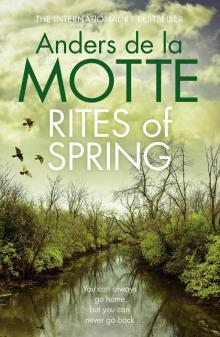 Rites of Spring
Rites of Spring Game: A Thriller
Game: A Thriller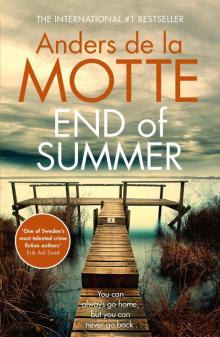 End of Summer
End of Summer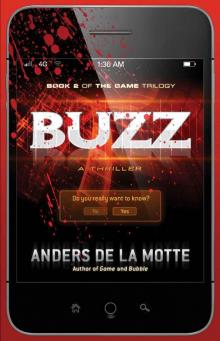 Buzz: A Thriller
Buzz: A Thriller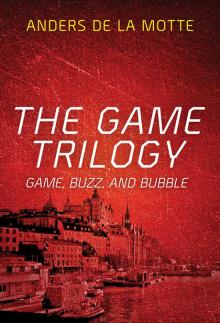 The Game Trilogy
The Game Trilogy Bubble: A Thriller
Bubble: A Thriller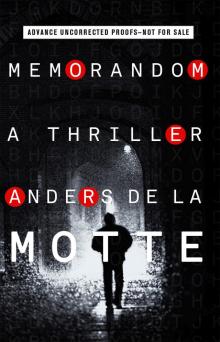 MemoRandom
MemoRandom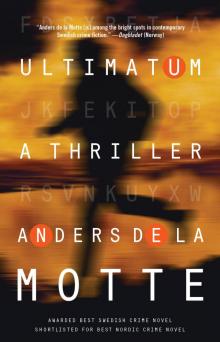 Ultimatum
Ultimatum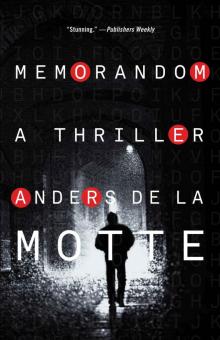 MemoRandom: A Thriller
MemoRandom: A Thriller